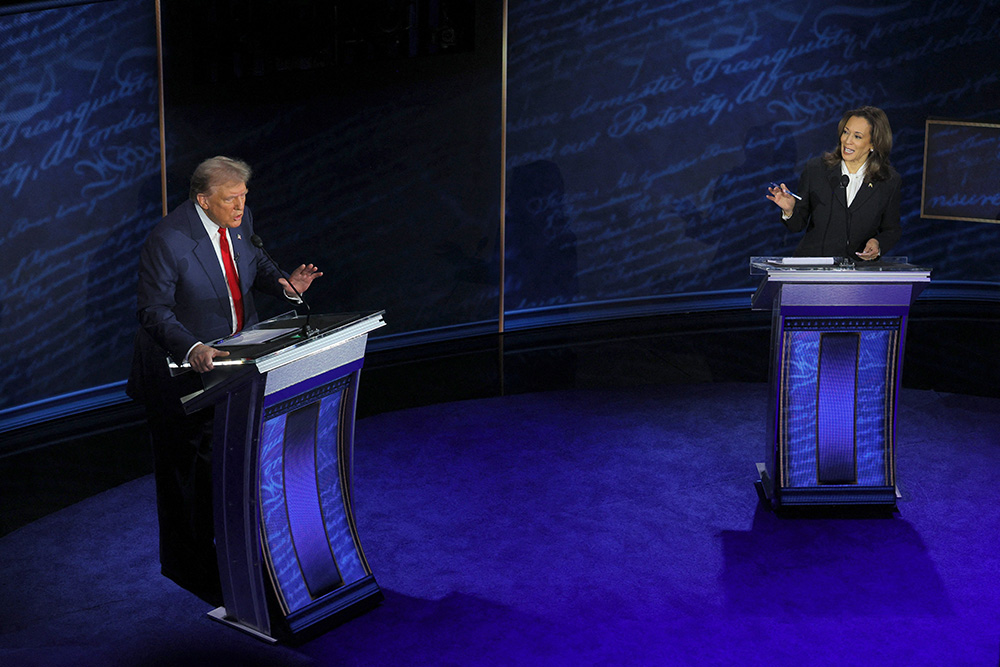
Republican presidential nominee and former U.S. President Donald Trump, and Democratic presidential candidate and U.S. Vice President Kamala Harris, take part in the presidential debate at the National Constitution Center in Philadelphia Sept. 10, 2024. (OSV News/Reuters/Brian Snyder)
Less than two months before Election Day, Vice President Kamala Harris and former President Donald Trump sparred over the economy, abortion and immigration, among other issues, in their first presidential debate on Sept. 10.
With various polls showing a virtual dead heat between the two candidates, Harris and Trump sought to define themselves and one another for undecided voters, particularly those in battleground states who will decide the election.
And with abortion emerging as a critical issue, especially among suburban women in swing states, the debate presented an opportunity for both candidates to stake out a position that could appeal to those voters.
For Harris, the moderators' question on abortion allowed her the chance to frame Trump as a hardline opponent of abortion rights whose first administration was to blame for the U.S. Supreme Court's overturning the constitutional right to an abortion in 2022.
"Let's understand how we got here. Donald Trump hand-selected three members of the United States Supreme Court with the intention that they would undo the protections of Roe v. Wade. And they did exactly as he intended," Harris said.
Noting that nearly two dozen conservative-leaning states have since banned or severely restricted abortion since the high court struck down Roe in its Dobbs v. Jackson Women's Health Organization ruling, Harris blamed Trump for criminalizing women's health care.
"And now in over 20 states there are Trump abortion bans which make it criminal for a doctor or nurse to provide health care. In one state it provides prison for life. Trump abortion bans that make no exception even for rape and incest," she said.
While taking credit for overturning Roe, an accomplishment that prompted Trump in 2023 to describe himself as the most pro-life president in history, the former president during the debate framed that achievement primarily as a victory for democracy.
"This is an issue that's torn our country apart for 52 years, every legal scholar, every Democrat, every Republican, liberal, conservative, they all wanted this issue to be brought back to the states where the people could vote and that's what happened," Trump said.
Asked if he would sign a national abortion ban — his running mate, U.S. Sen. JD Vance, has said Trump would veto such a measure — Trump told the debate moderators that the issue was a moot point.
"I'm not signing a ban, and there's no reason to sign a ban, because we've gotten what everybody wanted," he said.
Advertisement
Trump's debate answers on abortion came weeks after he angered leading antiabortion activists for statements that initially signaled he would vote in favor of a state constitutional amendment repealing Florida's six-week abortion ban. Trump backtracked and came out against the measure after being criticized by conservative pro-life leaders.
Political analysts have told National Catholic Reporter in recent interviews that Trump, in order to secure his bid to return to the White House, needs to appeal to moderate and independent voters who want abortion to be kept legal while at the same time not alienating his pro-life base.
"Because of Dobbs, the politics of abortion became infinitely easier for the Democrats and infinitely harder for the Republicans, and it put Trump in a difficult position because he's the person who did it through his Supreme Court appointments, which he wants to take credit for," said Geoffrey Layman, the chairman of political science at the University of Notre Dame.
Leading up to the debate, Layman told NCR that he would expect Harris to seize any opportunity to hammer Trump on the abortion issue.
"I think it's a winning issue for Democrats," Layman said. "Trump has tried to play the old Republican card where the Democrats are the pro-abortion extremists who will even kill children after they've come out of the womb. But I don't think that plays in the post-Dobbs world.
"So I think if I'm Trump, you don't want to talk abortion at all," Layman said. "You want to talk about immigration and the Biden record on that. You want to talk about wokeism, political correctness, the limitations on free speech that that may bring, and support for transgender rights. That's how you want to try to mobilize your base, not through abortion."
While he was reticent on the abortion issue during the debate, Trump indeed hammered Harris on other issues, such as the economy and immigration, for which he blamed President Joe Biden's administration numerous times for "ruining" the country by allowing undocumented migrants to cross the U.S. southern border at will.
"They've destroyed the fabric of our country. Millions of people let in. And all over the world crime is down. All over the world except here. Crime here is up and through the roof," said Trump, who at one point repeated unverified and disputed viral claims about Haitian migrants in Ohio eating people's pets.
"Talk about extreme," Harris said in response.
The former president's comments elicited significant commentary on social media, including from accounts that noted that Haitian migrants are predominantly Catholic. One notable Catholic figure, podcaster Gloria Purvis, described Trump's comments as "a shameful moment."







